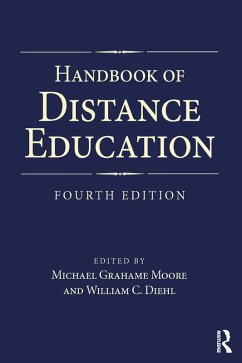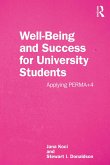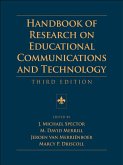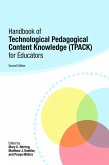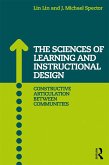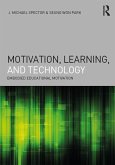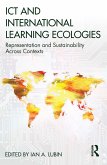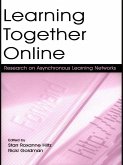Handbook of Distance Education (eBook, PDF)
Second Edition
Redaktion: Moore, Michael Grahame; Diehl, William C.
100,95 €
100,95 €
inkl. MwSt.
Sofort per Download lieferbar

50 °P sammeln
100,95 €
Als Download kaufen

100,95 €
inkl. MwSt.
Sofort per Download lieferbar

50 °P sammeln
Jetzt verschenken
Alle Infos zum eBook verschenken
100,95 €
inkl. MwSt.
Sofort per Download lieferbar
Alle Infos zum eBook verschenken

50 °P sammeln
Handbook of Distance Education (eBook, PDF)
Second Edition
Redaktion: Moore, Michael Grahame; Diehl, William C.
- Format: PDF
- Merkliste
- Auf die Merkliste
- Bewerten Bewerten
- Teilen
- Produkt teilen
- Produkterinnerung
- Produkterinnerung

Bitte loggen Sie sich zunächst in Ihr Kundenkonto ein oder registrieren Sie sich bei
bücher.de, um das eBook-Abo tolino select nutzen zu können.
Hier können Sie sich einloggen
Hier können Sie sich einloggen
Sie sind bereits eingeloggt. Klicken Sie auf 2. tolino select Abo, um fortzufahren.

Bitte loggen Sie sich zunächst in Ihr Kundenkonto ein oder registrieren Sie sich bei bücher.de, um das eBook-Abo tolino select nutzen zu können.
The Handbook of Distance Education, 4th Edition is a comprehensive compendium of research in the field of distance education.
- Geräte: PC
- mit Kopierschutz
- eBook Hilfe
- Größe: 4MB
Andere Kunden interessierten sich auch für
![Well-Being and Success For University Students (eBook, PDF) Well-Being and Success For University Students (eBook, PDF)]() Jana KociWell-Being and Success For University Students (eBook, PDF)25,95 €
Jana KociWell-Being and Success For University Students (eBook, PDF)25,95 €![Handbook of Research on Educational Communications and Technology (eBook, PDF) Handbook of Research on Educational Communications and Technology (eBook, PDF)]() Handbook of Research on Educational Communications and Technology (eBook, PDF)136,95 €
Handbook of Research on Educational Communications and Technology (eBook, PDF)136,95 €![Handbook of Technological Pedagogical Content Knowledge (TPACK) for Educators (eBook, PDF) Handbook of Technological Pedagogical Content Knowledge (TPACK) for Educators (eBook, PDF)]() Handbook of Technological Pedagogical Content Knowledge (TPACK) for Educators (eBook, PDF)89,95 €
Handbook of Technological Pedagogical Content Knowledge (TPACK) for Educators (eBook, PDF)89,95 €![The Sciences of Learning and Instructional Design (eBook, PDF) The Sciences of Learning and Instructional Design (eBook, PDF)]() The Sciences of Learning and Instructional Design (eBook, PDF)45,95 €
The Sciences of Learning and Instructional Design (eBook, PDF)45,95 €![Motivation, Learning, and Technology (eBook, PDF) Motivation, Learning, and Technology (eBook, PDF)]() J. Michael SpectorMotivation, Learning, and Technology (eBook, PDF)49,95 €
J. Michael SpectorMotivation, Learning, and Technology (eBook, PDF)49,95 €![ICT and International Learning Ecologies (eBook, PDF) ICT and International Learning Ecologies (eBook, PDF)]() ICT and International Learning Ecologies (eBook, PDF)41,95 €
ICT and International Learning Ecologies (eBook, PDF)41,95 €![Learning Together Online (eBook, PDF) Learning Together Online (eBook, PDF)]() Learning Together Online (eBook, PDF)46,95 €
Learning Together Online (eBook, PDF)46,95 €-
-
-
The Handbook of Distance Education, 4th Edition is a comprehensive compendium of research in the field of distance education.
Dieser Download kann aus rechtlichen Gründen nur mit Rechnungsadresse in A, B, BG, CY, CZ, D, DK, EW, E, FIN, F, GR, HR, H, IRL, I, LT, L, LR, M, NL, PL, P, R, S, SLO, SK ausgeliefert werden.
Produktdetails
- Produktdetails
- Verlag: Taylor & Francis eBooks
- Seitenzahl: 606
- Erscheinungstermin: 7. Dezember 2018
- Englisch
- ISBN-13: 9781315296128
- Artikelnr.: 56886363
- Verlag: Taylor & Francis eBooks
- Seitenzahl: 606
- Erscheinungstermin: 7. Dezember 2018
- Englisch
- ISBN-13: 9781315296128
- Artikelnr.: 56886363
- Herstellerkennzeichnung Die Herstellerinformationen sind derzeit nicht verfügbar.
Michael Grahame Moore is Distinguished Professor Emeritus of Education at The Pennsylvania State University, USA, and founder and editor of The American Journal of Distance Education, the first journal in its field. He published the first statement of theory about distance education in 1972 and has contributed to many other "firsts" in laying the foundations of the field. William C. Diehl is Coordinator of Online Graduate Programs in Lifelong Learning and Adult Education and Assistant Professor of Education at The Pennsylvania State University, USA. He is associate editor of The American Journal of Distance Education and director of The American Center for the Study of Distance Education.
Preface. I. Historical and Theoretical Foundations. An Overview
William C. Diehl 1. A History of Scholarship
Linda M. Black 2. Charles Wedemeyer and the First Theorists
William C. Diehl and Leslie Cano 3. The Theory of Transactional Distance
Michael Grahame Moore 4. Independent Learning
Jon Dron 5. The Community of Inquiry Theoretical Framework: Implications for Distance Education and Beyond
Martha Cleveland-Innes
D. Randy Garrison
and Norman Vaughn 6. Gender Still Matters in Distance Education
Edith Gnanadass and Amelia Y. Sanders 7. The State of Research on Distance
Online
and Blended Learning: Meta-Analyses and Qualitative Systematic Reviews
Robert M. Bernard
Eugene Borokhovski
and Rana M. Tamim II. Teaching and Learning. An Overview
William C. Diehl 8. Cognitive Perspectives on Online Learning Environments
Richard E. West
Michael J. Hannafin
Janette R. Hill
and Liyan Song 9. Distance Learning and Student Satisfaction
Mike Allen
Kikuko Omori
Andrew Cole
and Nancy Burrell 10. Instructional Strategies to Support Student Persistence
Tina M. Stavredes and Tiffany M. Herder 11. Motivation in Distance Education
Maggie Hartnett 12. The Role of Academic Libraries
Elaine Fabbro and Jennifer Rempel 13. Current Research in Blended Learning
Charles R. Graham 14. The Ethical Character of Distance Education: Relationship and Responsibility
Melody M. Thompson 15. Mobile Learning and Distance Education
Zane Berge 16. Pressures Impacting Distance Education in Higher Education and the Use of a Design-based Instructional Approach
Elizabeth Childs and Susan Crichton 17. The Use of Social Media in Higher Education Online and Blended Courses
Priya Sharma
Kim Tohill
Philip Tietjen
and Mahir Akgun 18. Frameworks for Designing and Analyzing Learning Activity Interactions in Online Courses
Vanessa P. Dennen 19. Theory to Practice in Instructional Design
Rick L. Shearer and Eunsung Park 20. Active Learning Strategies for Optimal Learning
Rebecca Heiser and Penny Ralston-Berg 21. Is Technology Enabling or Disabling for Diverse Learners Studying Online? Shelley Kinash
James Birt
and Madelaine-Marie Judd 22. Assessment for Culturally Inclusive Collaborative Inquiry-based Learning
Linda Barril III. Management
Policy
and Administration. An Overview
William C. Diehl 23. Distance Education Leadership Reconsidered
Michael F. Beaudoin 24. Needs Assessment and Strategic Planning in Distance Education
Ray Schroeder and Vickie Cook 25. National Policy and Policy in Distance Education
Van Davis 26. Future of Work in a Globalized World: Relevance of MOOCs for Continuous Learning
Sheila Jagannathan 27. Assuring Quality in Distance Education: Accreditation
Regulation
and the Standards Movement
Julie Hamlin and Lorraine Williams 28. Legal and Recent Copyright Issues
Tomas A. Lipinski and Martin J. Brennan 29. Strategies Used to Evaluate Online Education
Patrick Lowenthal and Gayle V. Davidson-Shivers 30. Teaching Online: Who? What? When? Where? Why? How? Kay Shattuck IV. Audiences and Providers. An Overview
William C. Diehl 31. Online Learning in the Community College Context
Shanna Smith Jaggars 32. Trends and Directions in Continuing Professional Education
Scott Gibbons
Matthew Yauk
and Kay Seo 33. Distance Education in the Armed Forces
Peggy L. Kenyon and Timothy Flora 34. Teaching Science at a Distance
Dietmar Kennepohl 35. Private and For-Profit Institutions: Evolution and Accountability
Shari L. Jorissen 36. Distance Education and Training in the Corporate Sector
Saul Carliner 37. The Landscape of K-12 Online Learning: Examining What is Known
Michael Barbour 38. Distance Education in Latin America
Beatriz Fainholc 39. Distance Education in Asia: Indonesia and Philippines
Tian Belawati and Melinda dela Peña Bandalaria
William C. Diehl 1. A History of Scholarship
Linda M. Black 2. Charles Wedemeyer and the First Theorists
William C. Diehl and Leslie Cano 3. The Theory of Transactional Distance
Michael Grahame Moore 4. Independent Learning
Jon Dron 5. The Community of Inquiry Theoretical Framework: Implications for Distance Education and Beyond
Martha Cleveland-Innes
D. Randy Garrison
and Norman Vaughn 6. Gender Still Matters in Distance Education
Edith Gnanadass and Amelia Y. Sanders 7. The State of Research on Distance
Online
and Blended Learning: Meta-Analyses and Qualitative Systematic Reviews
Robert M. Bernard
Eugene Borokhovski
and Rana M. Tamim II. Teaching and Learning. An Overview
William C. Diehl 8. Cognitive Perspectives on Online Learning Environments
Richard E. West
Michael J. Hannafin
Janette R. Hill
and Liyan Song 9. Distance Learning and Student Satisfaction
Mike Allen
Kikuko Omori
Andrew Cole
and Nancy Burrell 10. Instructional Strategies to Support Student Persistence
Tina M. Stavredes and Tiffany M. Herder 11. Motivation in Distance Education
Maggie Hartnett 12. The Role of Academic Libraries
Elaine Fabbro and Jennifer Rempel 13. Current Research in Blended Learning
Charles R. Graham 14. The Ethical Character of Distance Education: Relationship and Responsibility
Melody M. Thompson 15. Mobile Learning and Distance Education
Zane Berge 16. Pressures Impacting Distance Education in Higher Education and the Use of a Design-based Instructional Approach
Elizabeth Childs and Susan Crichton 17. The Use of Social Media in Higher Education Online and Blended Courses
Priya Sharma
Kim Tohill
Philip Tietjen
and Mahir Akgun 18. Frameworks for Designing and Analyzing Learning Activity Interactions in Online Courses
Vanessa P. Dennen 19. Theory to Practice in Instructional Design
Rick L. Shearer and Eunsung Park 20. Active Learning Strategies for Optimal Learning
Rebecca Heiser and Penny Ralston-Berg 21. Is Technology Enabling or Disabling for Diverse Learners Studying Online? Shelley Kinash
James Birt
and Madelaine-Marie Judd 22. Assessment for Culturally Inclusive Collaborative Inquiry-based Learning
Linda Barril III. Management
Policy
and Administration. An Overview
William C. Diehl 23. Distance Education Leadership Reconsidered
Michael F. Beaudoin 24. Needs Assessment and Strategic Planning in Distance Education
Ray Schroeder and Vickie Cook 25. National Policy and Policy in Distance Education
Van Davis 26. Future of Work in a Globalized World: Relevance of MOOCs for Continuous Learning
Sheila Jagannathan 27. Assuring Quality in Distance Education: Accreditation
Regulation
and the Standards Movement
Julie Hamlin and Lorraine Williams 28. Legal and Recent Copyright Issues
Tomas A. Lipinski and Martin J. Brennan 29. Strategies Used to Evaluate Online Education
Patrick Lowenthal and Gayle V. Davidson-Shivers 30. Teaching Online: Who? What? When? Where? Why? How? Kay Shattuck IV. Audiences and Providers. An Overview
William C. Diehl 31. Online Learning in the Community College Context
Shanna Smith Jaggars 32. Trends and Directions in Continuing Professional Education
Scott Gibbons
Matthew Yauk
and Kay Seo 33. Distance Education in the Armed Forces
Peggy L. Kenyon and Timothy Flora 34. Teaching Science at a Distance
Dietmar Kennepohl 35. Private and For-Profit Institutions: Evolution and Accountability
Shari L. Jorissen 36. Distance Education and Training in the Corporate Sector
Saul Carliner 37. The Landscape of K-12 Online Learning: Examining What is Known
Michael Barbour 38. Distance Education in Latin America
Beatriz Fainholc 39. Distance Education in Asia: Indonesia and Philippines
Tian Belawati and Melinda dela Peña Bandalaria
Preface. I. Historical and Theoretical Foundations. An Overview
William C. Diehl 1. A History of Scholarship
Linda M. Black 2. Charles Wedemeyer and the First Theorists
William C. Diehl and Leslie Cano 3. The Theory of Transactional Distance
Michael Grahame Moore 4. Independent Learning
Jon Dron 5. The Community of Inquiry Theoretical Framework: Implications for Distance Education and Beyond
Martha Cleveland-Innes
D. Randy Garrison
and Norman Vaughn 6. Gender Still Matters in Distance Education
Edith Gnanadass and Amelia Y. Sanders 7. The State of Research on Distance
Online
and Blended Learning: Meta-Analyses and Qualitative Systematic Reviews
Robert M. Bernard
Eugene Borokhovski
and Rana M. Tamim II. Teaching and Learning. An Overview
William C. Diehl 8. Cognitive Perspectives on Online Learning Environments
Richard E. West
Michael J. Hannafin
Janette R. Hill
and Liyan Song 9. Distance Learning and Student Satisfaction
Mike Allen
Kikuko Omori
Andrew Cole
and Nancy Burrell 10. Instructional Strategies to Support Student Persistence
Tina M. Stavredes and Tiffany M. Herder 11. Motivation in Distance Education
Maggie Hartnett 12. The Role of Academic Libraries
Elaine Fabbro and Jennifer Rempel 13. Current Research in Blended Learning
Charles R. Graham 14. The Ethical Character of Distance Education: Relationship and Responsibility
Melody M. Thompson 15. Mobile Learning and Distance Education
Zane Berge 16. Pressures Impacting Distance Education in Higher Education and the Use of a Design-based Instructional Approach
Elizabeth Childs and Susan Crichton 17. The Use of Social Media in Higher Education Online and Blended Courses
Priya Sharma
Kim Tohill
Philip Tietjen
and Mahir Akgun 18. Frameworks for Designing and Analyzing Learning Activity Interactions in Online Courses
Vanessa P. Dennen 19. Theory to Practice in Instructional Design
Rick L. Shearer and Eunsung Park 20. Active Learning Strategies for Optimal Learning
Rebecca Heiser and Penny Ralston-Berg 21. Is Technology Enabling or Disabling for Diverse Learners Studying Online? Shelley Kinash
James Birt
and Madelaine-Marie Judd 22. Assessment for Culturally Inclusive Collaborative Inquiry-based Learning
Linda Barril III. Management
Policy
and Administration. An Overview
William C. Diehl 23. Distance Education Leadership Reconsidered
Michael F. Beaudoin 24. Needs Assessment and Strategic Planning in Distance Education
Ray Schroeder and Vickie Cook 25. National Policy and Policy in Distance Education
Van Davis 26. Future of Work in a Globalized World: Relevance of MOOCs for Continuous Learning
Sheila Jagannathan 27. Assuring Quality in Distance Education: Accreditation
Regulation
and the Standards Movement
Julie Hamlin and Lorraine Williams 28. Legal and Recent Copyright Issues
Tomas A. Lipinski and Martin J. Brennan 29. Strategies Used to Evaluate Online Education
Patrick Lowenthal and Gayle V. Davidson-Shivers 30. Teaching Online: Who? What? When? Where? Why? How? Kay Shattuck IV. Audiences and Providers. An Overview
William C. Diehl 31. Online Learning in the Community College Context
Shanna Smith Jaggars 32. Trends and Directions in Continuing Professional Education
Scott Gibbons
Matthew Yauk
and Kay Seo 33. Distance Education in the Armed Forces
Peggy L. Kenyon and Timothy Flora 34. Teaching Science at a Distance
Dietmar Kennepohl 35. Private and For-Profit Institutions: Evolution and Accountability
Shari L. Jorissen 36. Distance Education and Training in the Corporate Sector
Saul Carliner 37. The Landscape of K-12 Online Learning: Examining What is Known
Michael Barbour 38. Distance Education in Latin America
Beatriz Fainholc 39. Distance Education in Asia: Indonesia and Philippines
Tian Belawati and Melinda dela Peña Bandalaria
William C. Diehl 1. A History of Scholarship
Linda M. Black 2. Charles Wedemeyer and the First Theorists
William C. Diehl and Leslie Cano 3. The Theory of Transactional Distance
Michael Grahame Moore 4. Independent Learning
Jon Dron 5. The Community of Inquiry Theoretical Framework: Implications for Distance Education and Beyond
Martha Cleveland-Innes
D. Randy Garrison
and Norman Vaughn 6. Gender Still Matters in Distance Education
Edith Gnanadass and Amelia Y. Sanders 7. The State of Research on Distance
Online
and Blended Learning: Meta-Analyses and Qualitative Systematic Reviews
Robert M. Bernard
Eugene Borokhovski
and Rana M. Tamim II. Teaching and Learning. An Overview
William C. Diehl 8. Cognitive Perspectives on Online Learning Environments
Richard E. West
Michael J. Hannafin
Janette R. Hill
and Liyan Song 9. Distance Learning and Student Satisfaction
Mike Allen
Kikuko Omori
Andrew Cole
and Nancy Burrell 10. Instructional Strategies to Support Student Persistence
Tina M. Stavredes and Tiffany M. Herder 11. Motivation in Distance Education
Maggie Hartnett 12. The Role of Academic Libraries
Elaine Fabbro and Jennifer Rempel 13. Current Research in Blended Learning
Charles R. Graham 14. The Ethical Character of Distance Education: Relationship and Responsibility
Melody M. Thompson 15. Mobile Learning and Distance Education
Zane Berge 16. Pressures Impacting Distance Education in Higher Education and the Use of a Design-based Instructional Approach
Elizabeth Childs and Susan Crichton 17. The Use of Social Media in Higher Education Online and Blended Courses
Priya Sharma
Kim Tohill
Philip Tietjen
and Mahir Akgun 18. Frameworks for Designing and Analyzing Learning Activity Interactions in Online Courses
Vanessa P. Dennen 19. Theory to Practice in Instructional Design
Rick L. Shearer and Eunsung Park 20. Active Learning Strategies for Optimal Learning
Rebecca Heiser and Penny Ralston-Berg 21. Is Technology Enabling or Disabling for Diverse Learners Studying Online? Shelley Kinash
James Birt
and Madelaine-Marie Judd 22. Assessment for Culturally Inclusive Collaborative Inquiry-based Learning
Linda Barril III. Management
Policy
and Administration. An Overview
William C. Diehl 23. Distance Education Leadership Reconsidered
Michael F. Beaudoin 24. Needs Assessment and Strategic Planning in Distance Education
Ray Schroeder and Vickie Cook 25. National Policy and Policy in Distance Education
Van Davis 26. Future of Work in a Globalized World: Relevance of MOOCs for Continuous Learning
Sheila Jagannathan 27. Assuring Quality in Distance Education: Accreditation
Regulation
and the Standards Movement
Julie Hamlin and Lorraine Williams 28. Legal and Recent Copyright Issues
Tomas A. Lipinski and Martin J. Brennan 29. Strategies Used to Evaluate Online Education
Patrick Lowenthal and Gayle V. Davidson-Shivers 30. Teaching Online: Who? What? When? Where? Why? How? Kay Shattuck IV. Audiences and Providers. An Overview
William C. Diehl 31. Online Learning in the Community College Context
Shanna Smith Jaggars 32. Trends and Directions in Continuing Professional Education
Scott Gibbons
Matthew Yauk
and Kay Seo 33. Distance Education in the Armed Forces
Peggy L. Kenyon and Timothy Flora 34. Teaching Science at a Distance
Dietmar Kennepohl 35. Private and For-Profit Institutions: Evolution and Accountability
Shari L. Jorissen 36. Distance Education and Training in the Corporate Sector
Saul Carliner 37. The Landscape of K-12 Online Learning: Examining What is Known
Michael Barbour 38. Distance Education in Latin America
Beatriz Fainholc 39. Distance Education in Asia: Indonesia and Philippines
Tian Belawati and Melinda dela Peña Bandalaria
